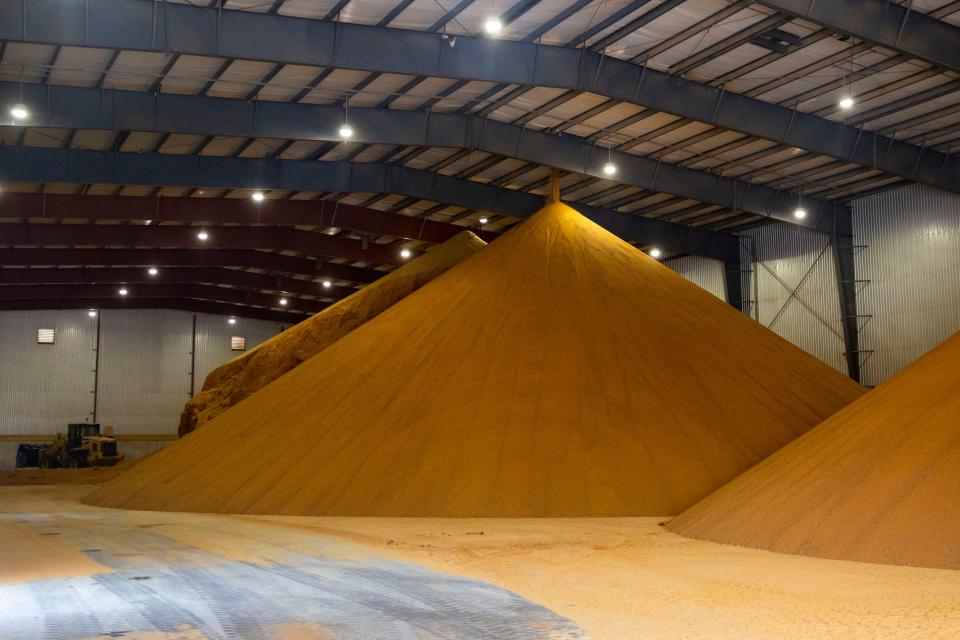EPA proposal to retroactively scale back renewable fuel blending requirements draws scorn
In a move critics call unprecedented, the U.S. Environmental Protection Agency is proposing to retroactively throttle back the amount of ethanol and biodiesel that was required to be blended into the nation's fuel supply in 2020.
The agency cited the national shutdown due to the coronavirus pandemic that drastically reduced fuel demand. The federal agency also wants to slim down the blending requirements for 2021 as the year nears an end.
However, it calls for aggressive blending requirements in 2022 and also proposes a policy that would limit blending exemptions for small oil refineries, which were freely handed out during the Trump administration. The changes are set to take effect after a public comment period and hearing.
President Donald Trump left office without setting the 2021 requirements. Amid delays, the EPA has proposed giving oil companies more time to meet both the 2021 and 2020 requirements, which means many refiners have yet to make the required purchases — and now would get a break.
The announcement Tuesday immediately drew the ire of Iowa Republicans and farm and renewable fuel groups.
“At a time when gas prices are through the roof and the administration is myopically focused on climate policy, it makes absolutely zero sense for President Biden to turn his back on cleaner, cheaper biofuels," U.S. Sen. Chuck Grassley said in a statement. He called the cut in blending levels for previous years "a boon for Big Oil."

"This decision is an about-face by President Joe Biden who campaigned on his supposed support for renewable fuels,” U.S. Sen. Joni Ernst said in a statement. “These (renewable volume obligations) will slash demand for biofuel and have devastating, long-lasting consequences for Iowa farmers and producers."
MORE: What we know about two carbon capture pipelines proposed in Iowa
Iowa is the nation's largest producer of ethanol and biodiesel. About half of the state's nation-leading corn crop goes to make ethanol. Iowa is the No. 2 grower of soybeans, a major component of biodiesel.
Under federal law, the EPA is required each year to set how much ethanol and biodiesel oil refiners must blend into the nation's fuel supply — a federal rule called the Renewable Fuel Standard, or RFS.
Though the original goal of the RFS was to promote U.S. energy independence, backers of the standard, like Grassley, now also cite studies showing ethanol produces fewer greenhouse gases than petroleum-based fuel. Lance Lillibridge, the Iowa Corn Growers Association board president, emphasized that point in condemning the move.
“President Biden says climate change is one of his top priorities, however, corn-based ethanol is the low-carbon, low-cost climate solution that is readily available now to lower fuel prices for consumers," Lillibridge, a farmer in Vinton in eastern Iowa, said in a statement. "Biden’s own EPA is undercutting the benefits of clean-burning ethanol and the livelihoods of corn farmers."

The Iowa Renewable Fuel Association says the EPA proposes cutting roughly 2.5 billion gallons from the 2020 blending requirements for corn-based ethanol, which were set in 2019. And it would cut 1.7 billion gallons from the 2021 statutory target that Congress set.
Gov. Kim Reynolds called the proposals a "slap in the face" for Iowa farmers and renewable fuel producers. “Yet again the Biden administration has failed Iowans and Iowa’s agriculture industry by destroying demand for over 4 billions of gallons of renewable fuel," Reynolds said in a statement.
“This announcement is beyond disappointing," she said.
MORE: U.S. bakers say Iowa is gobbling up soy oil for biodiesel, driving prices higher and limiting supply

The EPA said the proposals reflect "the Biden administration’s commitment to reset and strengthen the RFS program following years of mismanagement by the previous administration and disruptions to the fuels market stemming from the COVID-19 pandemic."
The 2022 blending requirements would set the "highest total volumes in history" at 20.77 billion gallons, the EPA said. It proposes the 2021 requirement be set at 18.52 billion gallons and would lower the 2020 standard to 17.13 billion gallons.
“Despite multiple challenging dynamics affecting the RFS program in recent years, EPA remains committed to the growth of biofuels in America as a critical strategy to secure a clean, zero-carbon energy future,” EPA Administrator Michael Regan said in a statement.
"This package of actions will enable us to get the RFS program back in growth mode by setting ambitious levels for 2022, and by reinforcing the foundation of the program so that it’s rooted in science and the law,” Regan said.
But the Iowa Renewable Fuel Association questioned whether the proposal to retroactively cut the 2020 requirements is legal — and its announcement at a time when the administration is scrambling to temper high fuel prices.
“The proposed rule from the Biden EPA falls woefully short of any attempt to leverage domestic biofuels to help lower fuel prices and carbon emissions,” Monte Shaw, the association's executive director, said in a statement. "Why on Earth should the United States be asking OPEC for more oil and releasing our strategic petroleum reserves, while at the same time proposing to undermine the one and only law on the federal books that seeks to expand domestic fuel supplies that reduce carbon emissions?"
U.S. Rep. Cindy Axne, an Iowa Democrat, joined congressional lawmakers from Wisconsin and Minnesota — also major biofuels-producing states — in a statement praising the proposed blending requirements for 2022.
The statement said the proposal would help lower prices at the pump for "hardworking Americans and accelerate the positive impact that biofuels can and must play in our effort to decarbonize the transportation sector, tackle climate change, and drive economic growth across rural America."
It also said the EPA's limit on exemptions would end "the abuse of small refinery exemptions — which provide relief to oil companies at the expense of family farmers."
But the statement said the 2020 retroactive cuts do "not reflect a sufficient commitment to renewable fuels and family farmers."
"As we have emphasized in repeated conversations with the administration, now is the time to invest in renewable biofuels and the communities they support — not to prioritize the interests of fossil fuel companies that continue to ignore the law of the RFS," the statement said.
Other supporters pointed to an EPA proposal to require oil companies to blend an additional 250 million gallons of biofuels in 2022 and again in 2023 to meet the requirements of a 2017 court order.
“EPA’s projection of strong biofuel blending requirements in 2022, commitment to halt illegal refinery exemptions, and long-awaited progress toward complying with a 2017 court order on lost gallons represent a welcome step forward," said Emily Skor, CEO of Growth Energy, a Washington, D.C., biofuels advocacy group.
However, she added, “Retroactive cuts to 2020 blending requirements impact the entire fuel supply chain, including the farmers, producers, blenders, retailers, and responsible refiners who based business decisions on final requirements in place for some time."
“This unprecedented move not only exceeds EPA’s legal authority under the RFS, it fails to recognize the law’s built-in mechanism that adjusts requirements when fuel demand differs from original projections," Skor said.
“The Biden administration simply cannot meet its climate goals while retroactively rolling back low-carbon biofuel blending requirements to help oil refiners.”
Donnelle Eller covers agriculture, the environment and energy for the Register. Reach her at deller@registermedia.com or 515-284-8457.
This article originally appeared on Des Moines Register: EPA calls for cuts to ethanol, biodiesel requirements for 2020, 2021
